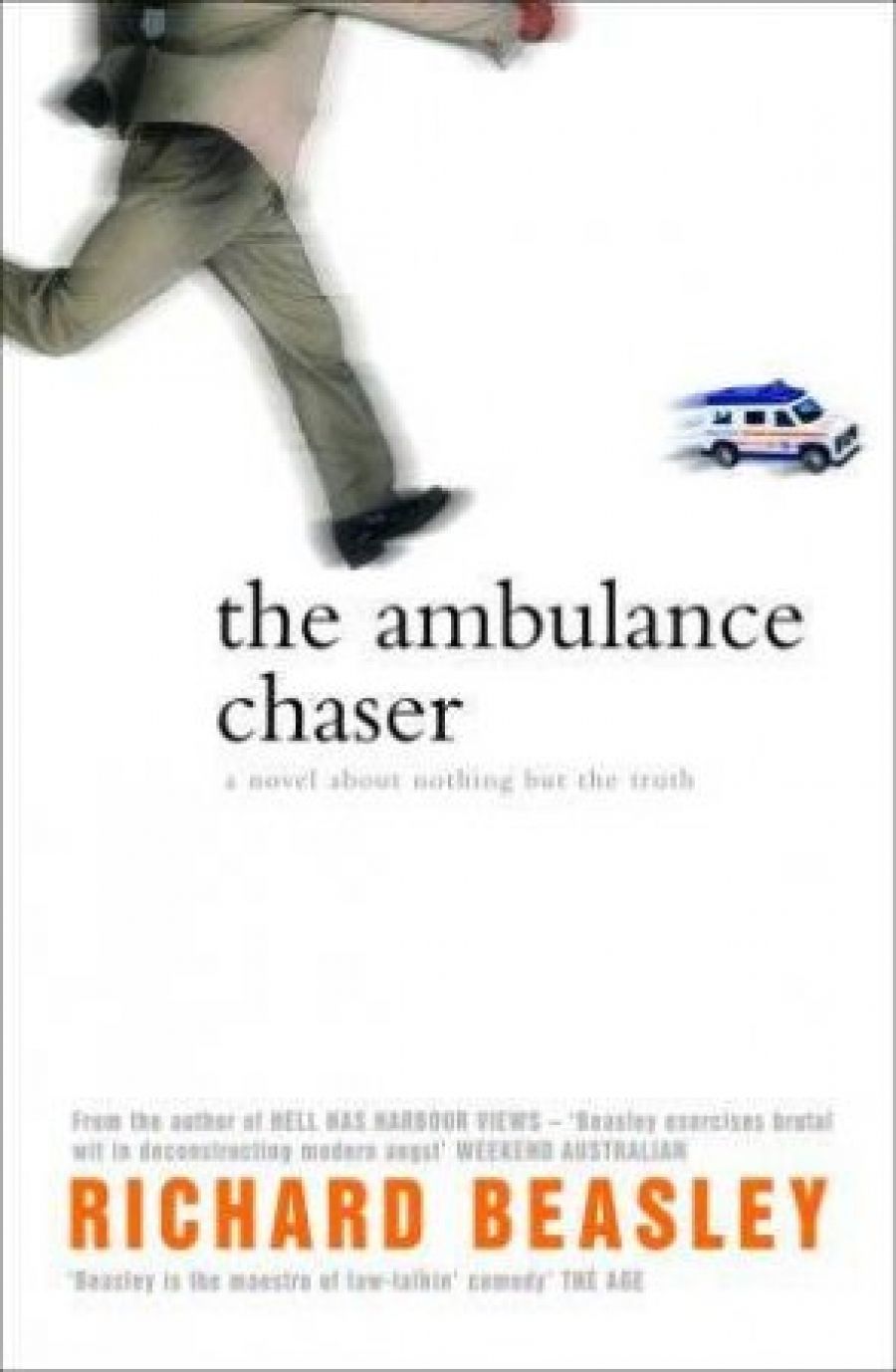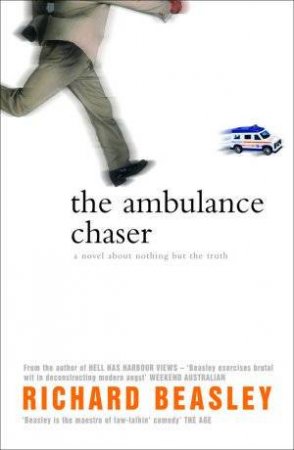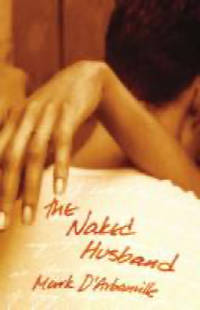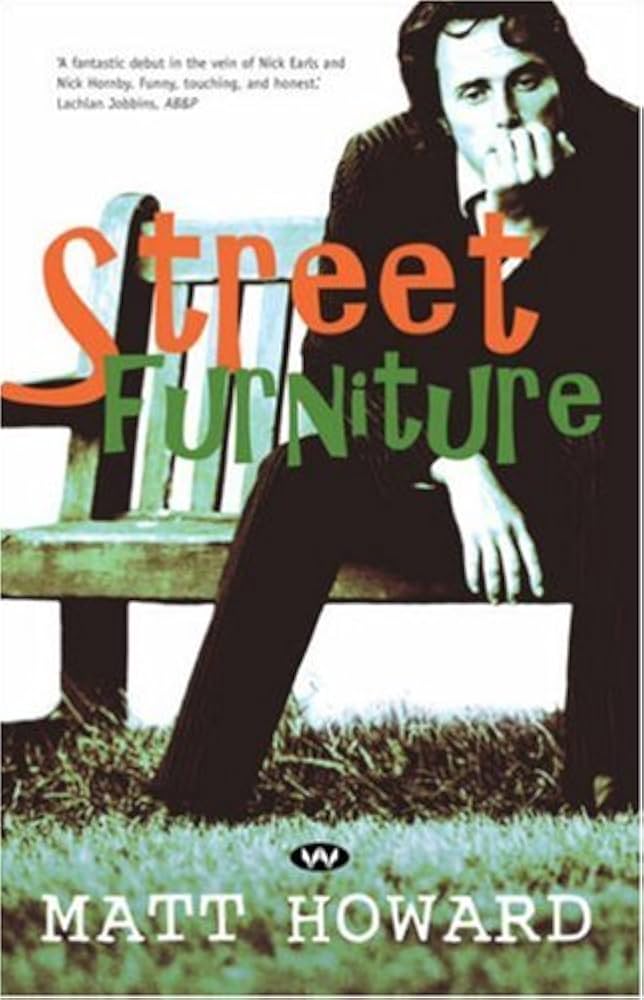
- Free Article: No
- Contents Category: Fiction
- Review Article: Yes
- Article Title: Dick Lit
- Online Only: No
- Custom Highlight Text:
Despite predictions that globalisation would homogenise cultures, ethnicity continues to split states asunder. Democratic theorists fear that consensus, equality and social capital are retreating before competition, materialism and resentment. The 2004 federal election campaign became a festival of individualism as alternative governments courted voters not with visions of a richer community but with promises of greater disposable household income after health and education costs.
- Book 1 Title: The Ambulance Chaser
- Book 1 Biblio: Macmillan, $30 pb, 356 pp
- Book 1 Cover Small (400 x 600):

- Book 1 Cover (800 x 1200):

- Book 2 Title: The Naked Husband
- Book 2 Biblio: Bantam, $22.95 pb, 273 pp
- Book 2 Cover Small (400 x 600):

- Book 2 Cover (800 x 1200):

- Book 3 Title: Street Furniture
- Book 3 Biblio: Wakefield Press, $29.95 pb, 230 pp
- Book 3 Cover Small (400 x 600):

- Book 3 Cover (800 x 1200):

Three recent novels illustrate this situation. While they are all written in the first person by Australian men, they describe diverse experiences. Mark D’Arbanville, an accomplished writer with a string of historical fiction and children’s books to his credit under other names, creates a scriptwriter so intensely obsessed with his relationships that a work on marriage and infidelity is his magnum opus. Richard Beasley, in his second novel, satirises the worlds of legal and business affairs in Sydney through the eyes of ‘struck off’ lawyer Chris Blake. Matt Howard’s début recounts the adventures of Declan McPherson, an idle suburban youth in his late twenties, who finally gains paid, if not very productive, employment as a publisher’s publicist. But do these books suggest broader directions for male authors? Do they announce the arrival of the cry from the heart by poor downtrodden men, a new wave of backlash, or some celebratory post-feminist snaggery?
The styles are as diverse as the themes. D’Arbanville’s bleak and depressing book is skilfully written. Suspicion, dissatisfaction and restlessness become guilt, shame and disgust as the narrator’s failures at contact and communication make him introverted and self-absorbed. The main character is trapped by his flawed introspection, and his relationships sour rather than enrich his life. He considers himself normal in the realm of relationships, someone who was ‘loved for being a husband; for my dependability, my reliability my ordinariness. Now I am cast as lover, the adventure, the excitement, the dirty secret. And I resent it just as much.’ He rationalises his position by asserting: ‘I want to be both to one woman and it’s what all men, perhaps all naked husbands, want more than anything.’ One hopes he is wrong to generalise that ‘women can fake an orgasm but men can fake a whole relationship’. Perhaps, some men can, but whether they do is another matter.
D’Arbanville is not obsessed with sex as such and is hardly pioneering a genre of ‘dick lit’. His narrator is preoccupied with a more understandable quest: the desperate pursuit of happiness. However, as he pours out his heart in self-pity, he becomes self-indulgent, expects too much and finds pleasure only in receiving, never in giving. Inevitably, his immaturity damages both those he loves and himself.
In its grim, gloomy English setting this is a humourless story. When the unsympathetic protagonist does manage to leave a destructive relationship, any faint hope for him quickly dissipates. Supposedly, women are more relationship-oriented than men, forming identities through links to others as wives, daughters, mothers and lovers. It is rare for a man to express relationship frustrations and to explore them so deeply. In the final analysis, however, the tale is one of failure. Typical of those caught in obsessions, the narrator treads water, replaying the same anxieties ad infinitum.
Richard Beasley is master of the one-liner and a great iconoclast. He ridicules everything A-list, from Sydney’s eating habits to its preoccupations with real estate and careers. Blake has discovered that his employer, an insurance company, underwrites its profits by eliminating clients with large claims outstanding. Beasley reserves his greatest disdain for tory politicians, that is, for anyone to the right of the Labor socialist left. He places the Hon. Clarrie Gerton in the ‘annals of Great Australian Political Deaths’ by having a male funnel web – ‘the world’s deadliest and only left-wing spider’ – bite him on the ‘wedding tackle’. Beasley’ characters are well rounded though quirky, especially the clients of the pro bono community legal centre where Blake serves a kind of penance to ease his conscience. There are trivial cases and serious ones, but when Blake helps the visa-less Samoan labourers Toffee and Kava recover wages from an exploitative employer, they become his loyal allies. Even the villains who conspire to murder those people expecting big insurance payouts have a human streak. While this plot is unlikely, most readers will overlook this flaw in such a pleasant diversion.
Matt Howard’s coming-of-age novel is a mixed offering. Four friends in their late twenties survive on the dole in Sydney’s west, while postponing adulthood as long as possible. Howard evokes the emptiness of the takeaway-food-and-video-rental routine well, and the characters seem appropriately shallow. When one dies tragically while leaving a job interview, narrator McPherson decides to leave the ranks of the unemployed. Ironically, perhaps, the characters start to unfold once employed, reinforcing the idea that our identities are bound up with the work that we do.
McPherson’s new life comes so easily that it is difficult to care strongly about his fate. His relationship with Smithy, for example, adapts to his new routines without any tension. Unlike D’Arbanville’s world in which everything goes wrong seriously, and Blake’s in which nothing much serious occurs at all, McPherson’s fortunes are so good that the story borders on melodrama. Anna, the workmate he adores, finds the simple suburban life irresistible and other colleagues realise the comparative emptiness of their sophisticated, materialistic, urban lives.
These three authors acknowledge the narrowing of reading habits. Blake keeps Chomsky and Nader books, The Female Eunuch and his ‘strategically tattered copy of The Second Sex’ in his bedroom on the grounds that ‘if there’s any chance for sex with a socialist-feminist, “be prepared” is my motto’. When attempting to seduce Gabrielle, who seems to be just such a creature, he notes that her library includes ‘not a great deal of chick lit’, but thinks that the presence of Bridget Jones shows she has a sense of humour. With the exception of hard-hearted reviewers, perhaps, we become what we read.
McPherson works in book publicity, so the titles he encounters are plausible concoctions. At a colleague’s house, he notices Economic Rationalism and the Politics of the Self, Lesbian Modelling in the Post-Feminist Era and The Anthropology of Ancient Death Masks, but supposes that, as they bear an ‘esoteric publisher’s logo’, she probably acquired them ‘by colour and size, to fit the décor rather than for their dry content’.
The only books mentioned in The Naked Husband contain the son’s maths homework. While its characters read many notes and e-mails, and diaries feature, the narrator is too uptight to sit at anything for too long. He is in a vicious cycle of anxiety, repetition, rationalisation, blame and guilt. Reading a book would demand of others, allowing them n independent existence beyond his own subjective needs and understanding their perspectives.
D’Arbanville’s suggestion that he understands what men want is an attempt to position himself as emotionally normal and unexceptional. Beasley aims only to entertain, but consequently does much more. Howard’s relaxed meander sometimes lacks purpose and responsibility, which might be appropriate to the subject matter. Collectively, these novels cover a range of men’s attitudes. They do not, however, represent anything as definitive as quintessential male experience.


Comments powered by CComment